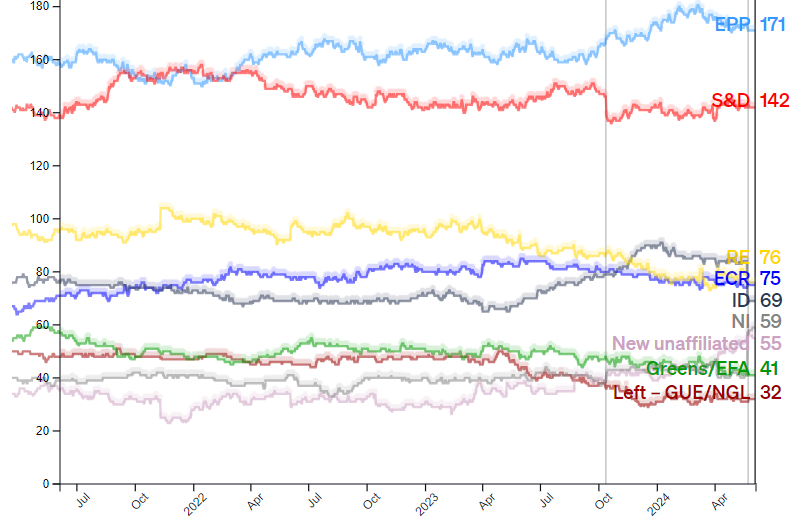European Parliament Election: A Swing to the Right?

This week-end (Jun 6-9 actually) sees fresh European Parliament elections, with it likely that that compared to the last (2019) result, there will be a clear swing to right-wing and/or populist parties. However, polls do not suggest anything like enough of swing away from the current parliamentary majority held by more centrist and pro-EU factions (S&D, EPP, Renew, and Greens *). Indeed, the most recent polls (Figure 1) predict these four pro-EU factions will win a majority of around 450 of the 720 seats in the European Parliament, despite losing possibly over 50 seats since 2019. The right-wing groups, however, are expected to increase their seat count by over 50, but with little immediate effect as divides on issues like NATO and Russia, mitigate against a broad and/or stable right-wing coalition. But there may be consequences as they may instead try and block reforms on on issues such as EU integration, green transition and migration.
Figure 1: Europeans Swing Somewhat to the Right

Source: Politico
This swing to the right may thus have little market impact, as has been the case with most other previous European election results. Admittedly, there may be concern that any gain by right wing and possibly EU-sceptic parties may be setting a staging post for winning a majority at the next European election in 2029, but many things can happen in the interim. Indeed, matters have changed already as Germany’s far-right Alternative for Germany party (AfD) has been expelled from European group Identity and Democracy in the European Parliament following a series of scandals
More imminently, on the fiscal side, as the current EU budget runs until 2027, means that the new Parliament can only effect the EU budget n from 2028. Moreover, the current Parliament has approved the new EU fiscal rules, all suggesting the elections will not impact fiscal policy near-term.
Where the election may have some impact if diplomatically, especially with China, the US, and the Ukraine. The changing dynamics in Parliament, which also approves the new European Commission, has already seen a more belligerent stance on China, particularly in the electric vehicles sector, something that current European Commission President Von der Leyen will probably continue in her likely second term promises more restrictions. Regardless, the ultimate decision-making body in EU foreign policy remains the European Council, which comprises the EU country heads of states and governments, albeit with clear divides evident within too. However, matters are changing; in 2014, the so-called lead candidate system was put forward whereby the political group that has the most seats in the European Parliament puts forward its nominee for Commission president. According to current projections, the group that’s likely to win the most votes is the conservative European People’s Party (EPP), whose lead candidate is none other than von der Leyen, someone who also has the overall approval of heads of state, as well.
*) Rather than the national political parties, there are instead political groupings within the parliament. The five largest are the European People's Party Group (EPP), the Progressive Alliance of Socialists and Democrats (S&D), Renew Europe (previously ALDE), the Greens/European Free Alliance (Greens/EFA) and Identity and Democracy (ID). NB: the definitive results of the EU Parliament election won’t be fully known until the morning of June 10